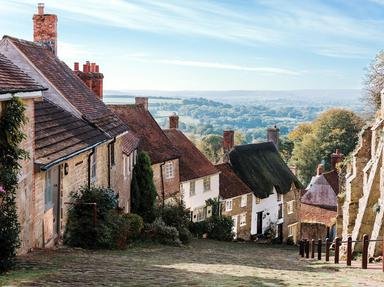Quiz Answer Key and Fun Facts
1. The sun is shining (well, this is make-believe!), you can feel the sand between your toes, and can hear the seagulls wheeling overhead. Welcome to the FunTrivia British beach! Britain has many famous coastal resorts, popular with Brits holidaying near home and tourists from around the world. Which of the following resorts is famous for its 'Pleasure Beach' and Illuminations?
2. Across the beach you hear a crowd of children laughing. You look and see a red and white striped ornately decorated box, with a puppet show going on inside. You wander across for a closer look and see a puppet with a large nose and distinctive squawking voice being chased by a female puppet with a slapstick! A police constable puppet tries to intervene, when out of nowhere appears a crocodile puppet too! What seaside tradition are you witnessing?
3. A common sight on the beaches of Britain during the 18th, 19th and early 20th centuries was the 'bathing machine'. Looking not unlike a modern garden shed on wheels, bathing machines would dot the water's edge, inside which people could change into their swimwear and safely store their street clothes before braving the cold Atlantic Ocean. But why were bathing machines used at all?
4. Whilst we are at the seaside, we must of course eat some traditional seaside fare! By now we most likely will have sand in our sandwiches and sea water in the flask of tea, so why not stop by a fish and chip shop? Of course, we order the British staple of cod and chips; to complete the meal, what would the usual side accompaniment be?
5. Luckily, the beach we are visiting today has kept up a great Victorian beach tradition - rides for the children! For a small fee, children can take rides up and down the sand, smiles lighting up their faces whilst the parents look on cringing. What are the children most likely to be riding?
6. Did you bring a bucket and a net? Because no trip to the beach is complete without a rock-pooling session! As you dip your net in the rockpool, you wonder just what you might find in there - which of the following will you NOT find in a British rockpool?
7. All over the beach children are turning buckets upside down, tapping them with spades and saying a magic word, before lifting the bucket up to reveal a sandcastle! But sandcastles aren't just for kids...where has the annual UK National Sandcastle Competition been held since it began in 1995?
8. A Great British institution was founded in Skegness in 1936, when the holiday camp idea for families was gathering pace. Accommodation, restaurants, amusements, entertainment, the seaside...these holiday camps were a great place to go when foreign travel was in its infancy. Named after the founder, what is the name of the chain still in operation today, with branches in Minehead, Skegness, and Bognor Regis?
9. The traditions of the seaside have been captured in so-called 'saucy postcards' since the 1930s. Featuring large ladies, put-upon husbands, and risque quotes, the saucy seaside postcard presented to the world the stereotypical British holiday resort - and the world loved them. Who is the most famous artist of these cards, active during the 1950s and later targeted by the Conservative government for being too 'immoral' in his art?
10. Our day at the beach has sadly come to the end, and it is almost time to go back home. But before we go, why not buy an edible souvenir to remind us of our beach trip? These hard cylindrical candy sweets often have the name of the seaside place where you bought it written though the centre, and is often coated in multi-coloured stripes. I am talking about a stick of...what?
Source: Author
crazy baby
This quiz was reviewed by FunTrivia editor
Pagiedamon before going online.
Any errors found in FunTrivia content are routinely corrected through our feedback system.

